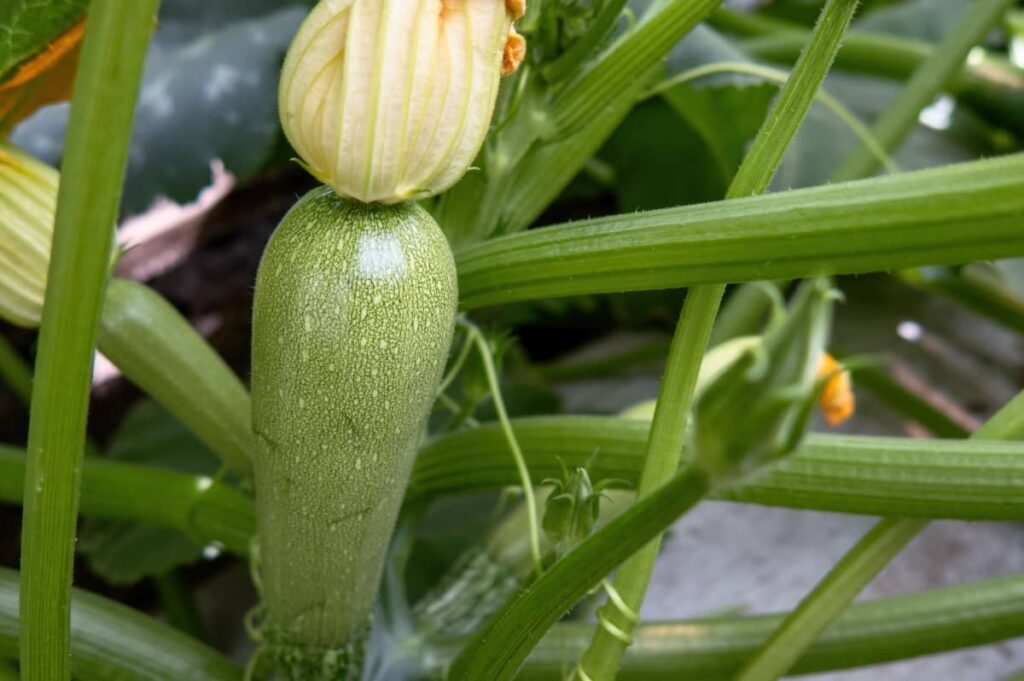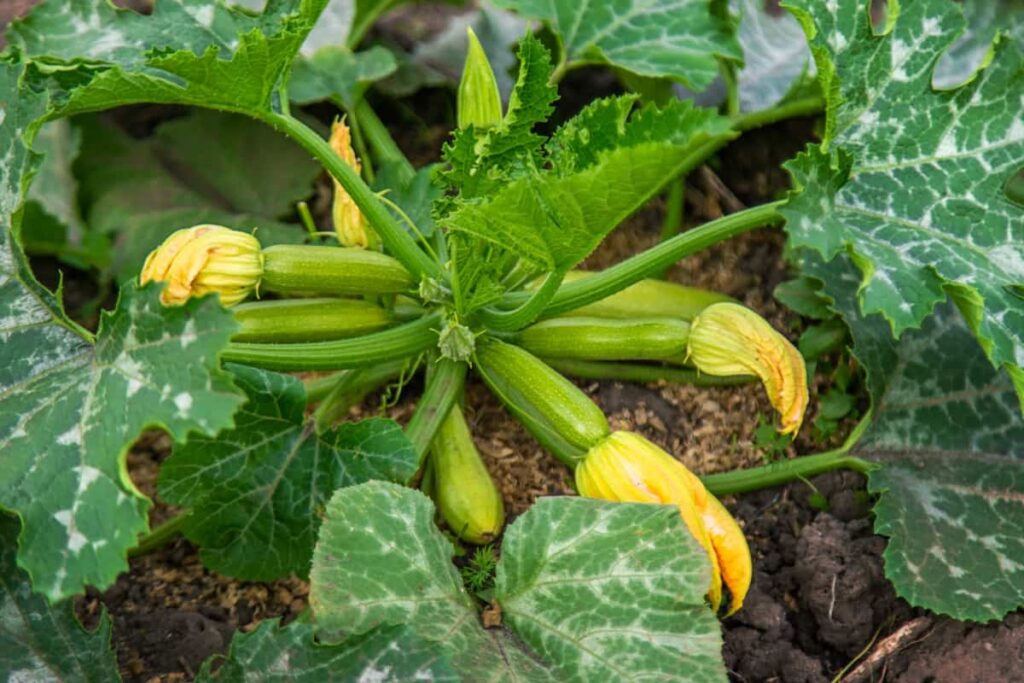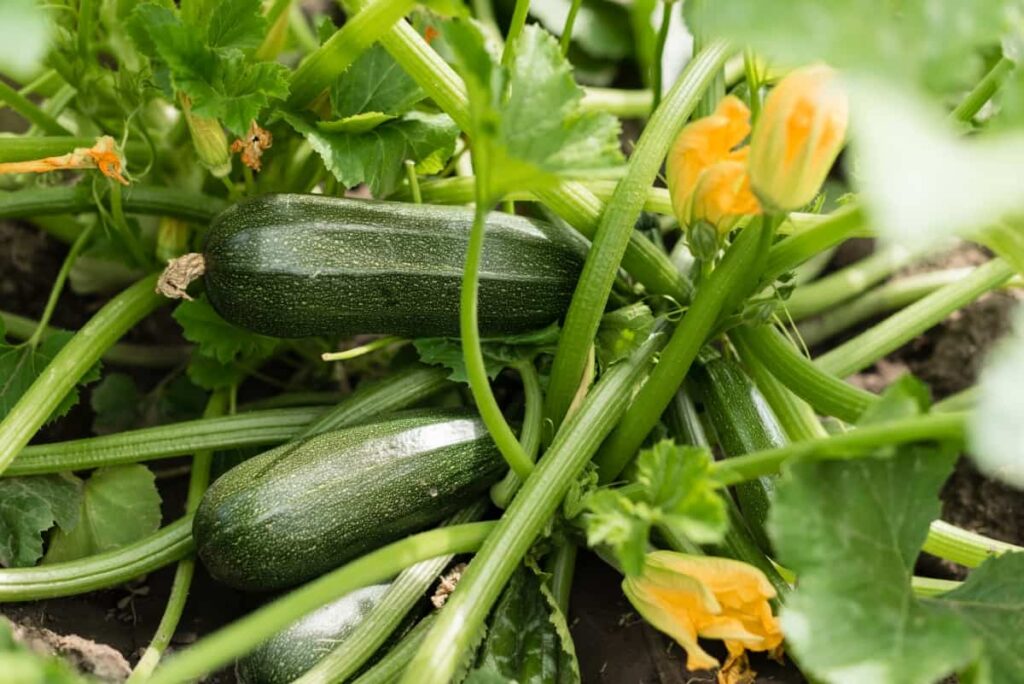Zucchini is a popular vegetable that is grown in many climates and seasons. Zucchinis are rich in nutrients such as vitamins A and C, potassium, and antioxidants. The plant’s reproductive structure consists of bright yellow, edible flowers that precede the development of the fruit. However, to get the best results from your zucchini plants, you need to provide them with the right fertilizer. In this article, we will discuss the best zucchini fertilizer options, when and how to apply them, and some tips for improving your soil and avoiding common fertilizing mistakes.

Best Zucchini Fertilizer
About Zucchini
Zucchini, scientifically known as Cucurbita pepo, belongs to the gourd family Cucurbitaceae. This warm-season summer squash is renowned for its cylindrical shape, vibrant green color, and mild flavor. Its botanical characteristics include large, dark green leaves and a bushy growth habit. Harvesting is typically done when the zucchini is young and tender, ensuring optimal taste and texture with high water content, low-calorie count, and versatility in culinary applications.
Best Zucchini Fertilizer Options
Zucchini plants are heavy feeders, meaning they require nutrients to grow and produce well. The main nutrients they need are nitrogen (N), phosphorus (P), and potassium (K), which are often represented by the N-P-K ratio on fertilizer labels. For example, a 10-10-10 fertilizer has 10% of each nutrient. Synthetic fertilizers are man-made products with concentrated nutrients, providing quick results, but can burn plants if overused or applied incorrectly.
They can also leach into groundwater, causing environmental problems. Organic fertilizers, on the other hand, are natural products from plant or animal sources, less concentrated but offering benefits like improved soil structure, increased microbial activity, and enhanced water retention. They are more environmentally friendly but can be more expensive and harder to find.
Examples of organic fertilizers include compost, manure, blood meal, bone meal, and fish emulsion. Organic zucchini plant food is a special type formulated for zucchini plants, containing the optimal balance of nutrients, beneficial microbes, and trace elements. It is easy to apply and safe for plants and the environment.
High-Yield Zucchini Fertilizers
If you want to get the most out of your zucchini plants, you need to use high-yield zucchini fertilizers. These are fertilizers that have a high N-P-K ratio, such as 20-20-20 or 15-30-15. These fertilizers provide a boost of nutrients to your plants during their peak growth and fruiting stages, resulting in bigger and healthier zucchinis.
High-yield zucchini fertilizers should not be used throughout the growing season due to potential issues like excessive leaf growth, nutrient imbalances, and soil acidity. Instead, use them once or twice during the season, preferably when the plants start to flower and set fruits.
How to Apply Zucchini Fertilizer
Before Planting
- Prepare soil with organic matter (compost or manure).
- Enhance soil texture, drainage, water retention, and nutrient availability.
- Test and adjust soil pH (preferably 6.0 to 6.5).
At Planting
- Add starter fertilizer to planting holes or rows.
- Choose a low N-P-K ratio (e.g., 5-10-10 or 4-12-12).
- Aids seedlings in root establishment and stem growth.
During Growth
- Side-dress plants every 2-4 weeks during active growth.
- Replenish nutrients with a balanced N-P-K ratio (e.g., 10-10-10 or 8-8-8).
During Flowering and Fruiting
- Switch to high-yield zucchini fertilizer.
- Support fruit production with a high N-P-K ratio (e.g., 20-20-20 or 15-30-15).
In case you missed it: Best Fertilizer for Cherry Trees: Organic, Natural, Homemade, NPK Ratio, and Schedule

Key Nutrients Your Zucchini Plants Need
Zucchini plants need a variety of nutrients to grow healthy and productive. Some of the key nutrients are nitrogen, phosphorus, potassium, calcium, magnesium, iron, manganese, zinc, copper, boron, and molybdenum. Nitrogen helps the plant produce green leaves and stems, phosphorus supports root growth and flowering, and potassium regulates water balance and enhances fruit quality.
Calcium strengthens cell walls, and prevents blossom end rot, magnesium is essential for photosynthesis and enzyme activity, iron transports oxygen in the plant, manganese activates enzymes and assists in photosynthesis, zinc regulates plant growth and development, copper is involved in chlorophyll synthesis and respiration, boron improves pollen tube growth and fruit set, and molybdenum is required for nitrogen fixation and nitrate reduction. These nutrients can be supplied by organic or synthetic fertilizers, as well as by adding organic matter to the soil.
Home Gardening Tips for Fertilizing Zucchini
Fertilizing zucchini at home can be done in two stages: before planting and during flowering. Before planting, prepare the soil by adding aged manure or compost to improve fertility and structure. Apply a balanced fertilizer, like 10-10-10 NPK, at 2 pounds per 100 square feet of garden bed.
This will provide the plant with the initial boost of nutrients it needs to grow. During flowering, you can apply a side dressing of fertilizer every two weeks to support fruit production. You can use a high-potassium fertilizer, such as 5-10-10 NPK, at a rate of 1 pound per 100 square feet of garden bed. Fish emulsion or seaweed extract may be diluted according to the package. Add organic mulch around plants to retain moisture and reduce weeds.
Eco-Friendly Fertilizing Methods for Zucchini
If you want to fertilize your zucchini in an eco-friendly way, you can use organic fertilizers that are derived from natural sources and do not harm the environment. Some examples of organic fertilizers are compost, manure, worm castings, bone meal, blood meal, alfalfa meal, cottonseed meal, feather meal, kelp meal, rock phosphate, greensand, wood ash, and coffee grounds.
These fertilizers provide a range of nutrients to the plants and also improve the soil health by adding organic matter and beneficial microorganisms. You can apply these fertilizers before planting or as a side dressing during the growing season. You can also make your own compost tea or manure tea by steeping compost or manure in water for a few days and then spraying it on the plants.
Expert Advice on Fertilizers for Zucchini Growth
Zucchini, a fast-growing crop, requires regular fertilization for optimal growth. To ensure optimal results, choose a fertilizer that matches the soil’s pH and nutrient levels, apply it at the right time and rate, and water your plants well before and after fertilization to prevent leaching.
Avoid over-fertilizing or under-fertilizing your plants, as too much can cause excessive growth, reduced fruiting, salt accumulation, nutrient imbalance, pest problems, and environmental pollution. At the same time, too little can cause stunted growth and poor fruiting. Watering well before and after fertilization helps prevent fertilizer burn and leaching.
Best Times to Fertilize Zucchini Throughout the Year
- Prepare the soil with organic matter and an all-purpose fertilizer with a balanced nitrogen, phosphorus, and potassium (NPK) ratio. This will improve drainage and aeration for the seeds or transplants.
- When flowering, add another dose of fertilizer, either all-purpose or an organic option like fish emulsion, bone meal, blood meal, or kelp.
- Apply the fertilizer around the plant’s base and water it well.
In case you missed it: Best Fertilizer for Squash: What, When, and How to Apply

Improving Soil for Better Zucchini Harvests
Zucchini plants thrive in rich, well-drained soil with organic matter and beneficial microorganisms. To improve soil quality, test the pH with a kit or meter and adjust with lime or sulfur if needed. Add organic matter like compost, aged manure, grass clippings, or leaves to improve soil structure, fertility, water retention, and microbial activity. Add 2-4 inches of organic matter to topsoil before planting zucchini.
Mulch with straw, wood chips, or shredded leaves helps retain moisture, suppress weeds, moderate soil temperature, and prevent soil erosion. Mulch also adds organic matter as it decomposes over time.
Avoid These Zucchini Fertilizing Mistakes
Zucchini plants require proper fertilization for optimal growth and fruit production. Common mistakes include over-fertilizing, which can cause issues like salt buildup, nutrient imbalance, leaf burn, and excessive vegetative growth. Under-fertilizing can lead to poor growth, low yield, weak resistance to pests and diseases, or nutrient deficiencies. Regular fertilization is crucial throughout the growing season. Fertilizing at the wrong time is also important, as it can interfere with germination, root development, flowering, or fruiting. It’s crucial to follow label instructions and avoid over-fertilizing.
In case you missed it: When to Fertilize Citrus Trees in Pots: Schedule for Winter, Summer, and Spring

Conclusion
Choose the best zucchini fertilizer for optimal growth. Before planting, prep soil with organic matter and adjust pH. Use a low N-P-K ratio when planting for strong roots. During growth, apply a balanced fertilizer every 2-4 weeks. Transition to a high N-P-K ratio during flowering for abundant, quality fruits. Maximize yields with strategic application.
- Broccoli Varieties: Choosing the Right Cultivars for Your Farm
- How to Raise Pigs in Your Own Backyard: A Comprehensive Guide
- Budget Friendly Sheep Shed Ideas: Cheap and Low-Cost Tips
- How Much Do Cattle Farmers Make: Revenue Streams in Cattle Farming
- Management Pests and Diseases in Your Cotton Field
- Sheep Farming Business Plan for Beginners
- Aquaponic Farming at Home: A Step-By-Step Guide
- Profitable Village Farming Business Ideas in 2024
- High-Yield Aquaculture: Fast-Growing Fish for Farming
